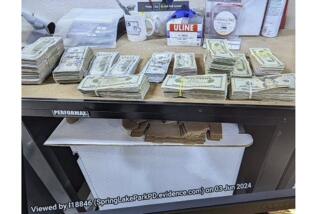Sloppy Practices Cited in $1.6-Million Tax Loss
SACRAMENTO — Sloppy administrative practices by the state Department of Fish and Game enabled commercial fish enterprises to avoid paying $1.6 million in state taxes since 1982, a state audit disclosed Wednesday.
The unpaid taxes are owed by fishermen, processors, canners and wholesalers, according to Auditor General Thomas Hayes in a report ordered by the Legislature.
The Fish and Game Department said it is awaiting a legal opinion from the attorney general’s office on whether to collect those back taxes. But a fishing industry spokesman said the industry would fight any such attempt.
“We didn’t uncover any conspiracy,” Hayes said in an interview. “But they are not, in fact, collecting all the fish taxes they are required to under the law.”
Some of the department’s administrative practices criticized in Hayes’ report go back several decades and, as a result, the loss in state income likely is much higher, department officials conceded.
Hayes said his investigation covered only the last three years because the department “does not have records that are accurate” before 1982.
The audit was requested by Assemblywoman Doris Allen (R-Cypress), one of the Fish and Game Department’s most persistent critics. She agreed that a “misinterpretation” had occurred but insisted, “It is more than that--it is mismanagement of the department.”
Peter Bontadelli, special assistant to Fish and Game Director Jack C. Parnell, said the department began examining its own tax-collection practices last year, after legislative critics and others expressed concern that the state was being underpaid.
No commercial fish businesses are mentioned by name in the 47-page audit, which outlined what Hayes called a number of “poor administrative practices.”
The report said the biggest loss of tax revenue, about $1.3 million, resulted from the department’s longstanding practice of taxing processed fish products only once--at dockside when a catch is unloaded. The tax is assessed according to weight of the fish.
But the report said that a tax should be levied again, when one wholesaler sells a catch to another or to a canner.
The audit also cited instances where some shrimp wholesalers have paid taxes of $2.60 a ton, instead of the $25 a ton prescribed by law, Hayes pointed out. The lower rate was applicable to some other species but not to shrimp.
Bontadelli said the admittedly incorrect lower rate has been levied uniformly among all shrimp wholesalers. But that was disputed by William Burke, chairman of the Fish and Game Commission, the five-member policy board that oversees the department.
Burke charged that some shrimp wholesalers have been allowed to pay the lower rate while others have been charged the $25 statutory rate. He noted that he has been raising questions about the department’s revenue collections for nearly five years, “and I have received less than enthusiastic cooperation.”
Internal Examination
Bontadelli said the department wants to remedy the problems cited in the audit, adding that the department’s own examination of its taxing policies indicated that department officials had been misreading the statutes.
He said the department has sought an opinion from Atty. Gen. John Van de Kamp on whether Fish and Game officials are now correctly reading the laws and whether to begin collecting the back taxes.
But commercial fish industry lobbyist Rob Ross, spokesman for the California Fisheries Assn. and the California Seafood Institute, said fishermen were not at fault and that the industry would likely launch a court fight if the department tries to collect.
More to Read
Inside the business of entertainment
The Wide Shot brings you news, analysis and insights on everything from streaming wars to production — and what it all means for the future.
You may occasionally receive promotional content from the Los Angeles Times.










